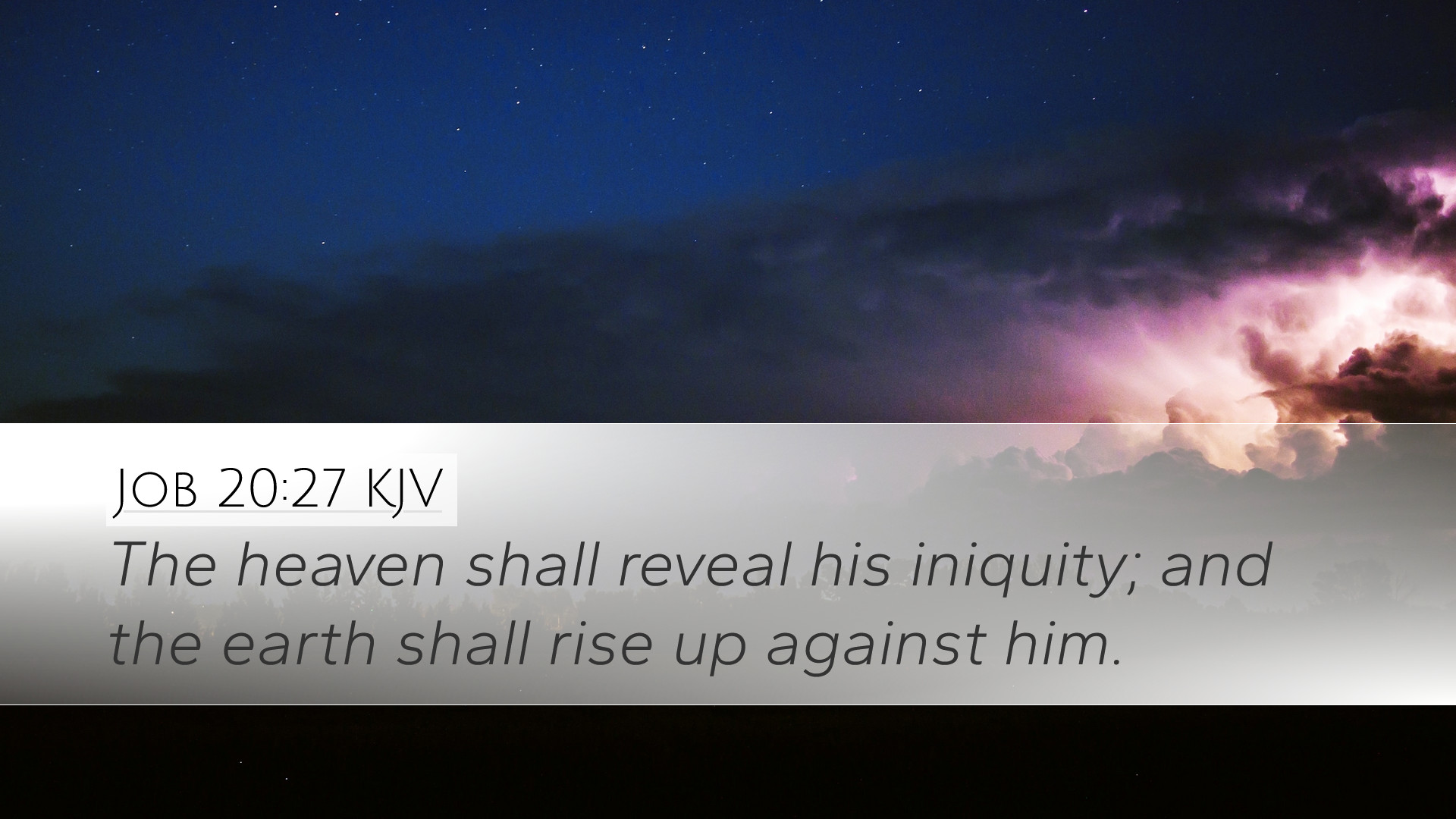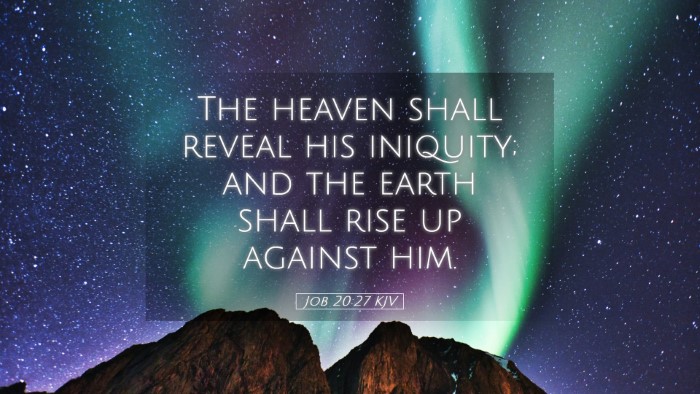Old Testament
Genesis Exodus Leviticus Numbers Deuteronomy Joshua Judges Ruth 1 Samuel 2 Samuel 1 Kings 2 Kings 1 Chronicles 2 Chronicles Ezra Nehemiah Esther Job Psalms Proverbs Ecclesiastes Song of Solomon Isaiah Jeremiah Lamentations Ezekiel Daniel Hosea Joel Amos Obadiah Jonah Micah Nahum Habakkuk Zephaniah Haggai Zechariah MalachiJob 20:27
Job 20:27 KJV
The heaven shall reveal his iniquity; and the earth shall rise up against him.
Job 20:27 Bible Commentary
Commentary on Job 20:27
Introduction: Job 20:27 reads: "The heavens shall reveal his iniquity, and the earth shall rise up against him." This verse is part of Zophar's speech, one of Job's friends, who brings accusations against Job. In this commentary, we will explore the implications of this text through insights gleaned from esteemed public domain commentaries, focusing on the themes of divine justice, the consequences of sin, and the broader context of human suffering.
Contextual Background
The book of Job presents a profound exploration of suffering and divine justice. Zophar, the Naamathite, speaks in Job 20 in a more agitated tone than his fellow friends, suggesting that the wicked shall face inevitable divine judgment. This chapter brings to light the theme of retribution theology, which was prevalent among the Ancient Near Eastern cultures at the time.
Divine Revelation of Iniquity
Heaven's Revelation: The phrase "the heavens shall reveal his iniquity" signifies that God's knowledge and perception of human sin is not limited to man’s hidden actions. Matthew Henry emphasizes that God is omniscient, and all that is concealed from human eyes is exposed to the heavens. Revelation here implies that divine judgment is inevitable, and nothing escapes God’s omnipotent gaze.
Earth as Witness: The latter part of the verse, "the earth shall rise up against him," suggests that not only does God observe human behavior, but the very creation bears witness to the iniquity of mankind. Adam Clarke points out that the earth can be seen as a witness against the wicked, embodying God’s declaration of justice. Sin has repercussions that transcend the individual, affecting creation itself.
The Nature of Iniquity and Judgment
Iniquity Defined: Zophar's assertion focuses on the nature of iniquity as something that is ultimately brought to light. Albert Barnes articulates that iniquity in biblical terms not only refers to sinful acts, but also to a state of being that is contrary to God's righteousness. It encompasses everything from moral failings to blatant rebellion against God.
Consequences of Sin
The consequences of iniquity are both immediate and eternal. Zophar’s remarks echo the principle of reaping what one sows, as discussed in Galatians 6:7. The swift judgment of God upon the wicked is a reoccurring theme throughout scripture, reinforcing the idea that sin has dire consequences that manifest not only spiritually but also physically and existentially.
- The spiritual consequence involves separation from God.
- Moral ramifications include loss of integrity.
- Physical evidence of judgment may surface in turmoil and distress.
Application for the Faithful
For pastors and theologians, Job 20:27 serves as a timely reminder of God’s justice amidst human suffering. It prompts critical reflection on the lives of the faithful and the nature of their walk with God.
Encouragement in Righteousness
The verse not only warns against iniquity but also encourages believers to pursue righteousness. Matthew Henry suggests that the consideration of divine justice should lead believers to an introspective faith, renewing their commitment to holiness, as one's actions will ultimately come to light.
Hope Amidst Suffering
For those enduring hardship—be it personal struggles, social injustices, or spiritual battles—Zophar's message encapsulates a dual narrative of warning and hope. While acknowledging God's judgment of sinfulness, it also emphasizes that God is sovereign over the world’s events, including human suffering.
Conclusion
In conclusion, Job 20:27 encapsulates the profound truth that iniquity cannot remain hidden from the eyes of God. It serves both as a caution to those who engage in unrighteousness and a source of encouragement to the faithful. While the wicked will face judgment, believers are reminded of God’s unwavering commitment to justice in the cosmos.
In pastoral settings, this verse could be a powerful tool for teaching about righteousness, the nature of sin, and the assurance of divine justice. For the student of scripture, it serves as a call to deeper understanding of God’s character as both just and merciful.


